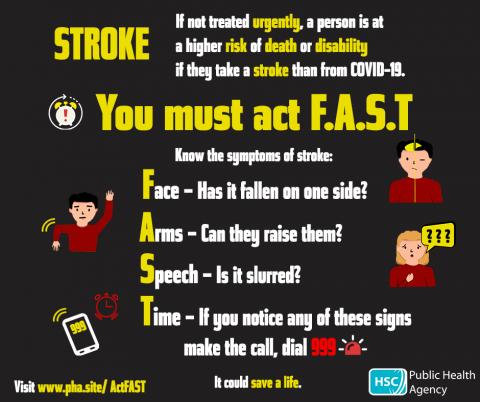Northern Ireland stroke services continue to operate in the COVID-19 pandemic

The Public Health Agency (PHA) is reminding the public of the importance of seeking urgent medical care if they experience any of the symptoms of stroke and that help is available for those who need medical attention.
A person is at a higher risk of death or disability if they take a stroke, than from COVID-19, if not treated urgently.
A stroke is a medical emergency and requires immediate medical attention, so recognising a stroke and calling 999 is crucial. To be most effective, stroke treatments such as thrombolysis (clot dispersal) and thrombectomy (clot removal) must be provided for suitable patients within a defined timeframe.
Any delays in seeking medical attention could mean that otherwise suitable patients will not benefit from these life changing treatments
Dr Michael McCormick, Clinical lead at NI Stroke Network said: “Across Northern Ireland people are following the ‘stay at home’ advice as outlined in the COVID-19 restrictions, but we are concerned that many people are choosing to stay at home when they should be seeking medical attention. The first wave of the pandemic saw a significant reduction in stroke attendances to hospital. This was not unique to Northern Ireland and has been mirrored in many other countries.
“A recent article from the World Stroke Academy, following analysis of 187 stroke centres across 40 countries, reported a reduction in key stroke metrics such as stroke admissions and ischaemic stroke numbers during the first surge of the COVID-19 pandemic in March - May 2020.
“Indeed the NI Stroke Network noted a reduction in stroke admissions (20.3%) and patients receiving thrombolysis (33%) during this time. Delays in the time patients presented after onset of stroke was one factor in the drop in thrombolysis rates.
Dr McCormick added: “The NI Stroke Network and PHA undertook a number of public awareness campaigns to encourage people to act FAST and dial 999. Whilst an increase could be seen in numbers of patients from June, there has been a decline in November and December 2020. Please act FAST so the stroke service can help you.
If you think someone is having a stroke, follow the FAST approach:
• Face - Has it fallen on one side?
• Arms - Can they raise them?
• Speech - Is it slurred?
• Time - make the call immediately, Dial 999
If you notice even one of these signs, no matter how mild, make the call.
Fiona Quigg, Deputy Commissioning Lead, HSCB and Coordinator for NI Stroke Network NI Stroke Network said:
“Stroke is the third most common cause of death and one of the main causes of adult onset disability in Northern Ireland, but early diagnosis improves the chances of a good recovery.
“To reduce the risk of COVID-19, inpatient stays are minimised. Patients are discharged as soon as possible to continue their specialised stroke treatment by either Trust Community Stroke Teams or by Voluntary Sector providers NI Chest, Heart & Stroke and Stroke Association. This may be delivered face to face and supported through the use of technology.”
“Many serious conditions such as stroke and heart attack can be successfully treated if patients receive care quickly – but could be devastating or fatal if treatment is delayed. Please do not delay seeking appropriate care out of fear of COVID-19. Call 999 if you need urgent medical attention. The life you save may be your own.”
For further information on stroke visit www.pha.site/ActFAST
The Northern Ireland Stroke Network is an action focused group established to implement improvements in stroke services in line with:
New Decade, New Approach (NI Executive, 2020)
Reshaping Stroke Care – Saving Lives, Reducing Disability (DoH, 2019)
Systems not Structures, Changing Health & Social Care (2016)
National Clinical Guidelines (NICE CG68, CG162)
Improving Stroke Services in Northern Ireland (DHSSPS, 2008)
The NI Stroke Network brings together the stakeholders in stroke care – providers, commissioners and patients - to support the development of high quality, cost effective and equitable stroke services.
Broad representation from all groups planning and delivering Stroke Services in Northern Ireland:
Senior managers from six Health and Social Care Trusts
Department of Health
Health and Social Care Board / Public Health Agency
Voluntary Sector – NI Chest Heart and Stroke / Stroke Association
Service Users / Carers
ICP
Clinicians
Professional Leads
Service Improvement Lead
